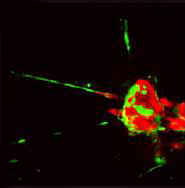Join our Team!
Looking for enthusiastic and highly motivated individuals interested in contributing to the advancement of breast cancer research.
Contact [email protected] for more information about available positions and how to apply.
What We Do
Breast Cancer Prevention

We are interested in designing new strategies for breast cancer prevention by understanding how changes in the heterogeneous cell populations present in breast tissues contribute to the development of breast cancer.
- We utilize a new method for culturing breast tissue as organoids to define the cell lineages present in the normal mammary gland as well as in cancer prone tissues. By combining this model system with single-cell technologies, our research has yielded an increased understanding of the cellular heterogeneity present in normal breast tissue, elucidated how these cells change during processes such as aging, and identified novel cell types associated with premalignant states.
- We are currently investigating pathways that promote these premalignant cell types in organoids and that may be activated during the earliest stages of tumorigenesis. These findings reinforce the hypothesis that breast tissue at both the normal and malignant stage is characterized by alterations in cellular heterogeneity that act to promote cancer development and can also be blocked to prevent cancer initiation or progression.
- We test this hypothesis by interrogating cell composition and function in breast tissue at high risk of developing breast cancer, as compared to low or average risk, and by working with a team of investigators in the Breast Oncology Program in the Helen Diller Family Comprehensive Cancer Center to develop new clinically-relevant risk categories for Ductal Carcinoma in Situ, a non-obligate precursor of invasive breast cancer.
Aggressive Breast Cancer Subtypes


Inflammatory Breast Cancer (IBC) - an aggressive subtype of breast cancer that is often diagnosed in younger patients - is enriched for the HER2+ and triple-negative subtypes and is associated with increased likelihood of early metastasis. It is a rare subtype of breast cancer that is associated with a worse prognosis, and accounts for ~10% of breast cancer mortality. IBCs are characterized by swelling and redness of the breast, caused by clusters of tumor cells that block the local lymphatic vessels.
- We are using a panel of patient-derived IBC organoid cultures to understand the biologic underpinnings of this aggressive cancer type.
- Gene expression signature and protein biomarkers of resistance, developed from multilayered clinical trail data, are being assessed in IBC through these organoid avatars.
- We are performing high-throughput compound screens to develop new therapeutic targets that can be translated into clinical trials for metastatic IBC.
Resistant Cancers
- This approach is also being extended to additional aggressive subtypes of breast cancer, as well as multiply resistant disease in collaboration with the ISPY2 clinical trial.